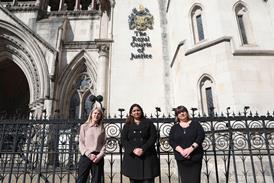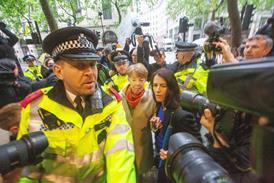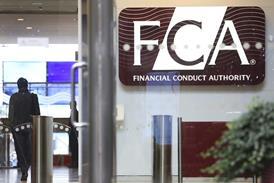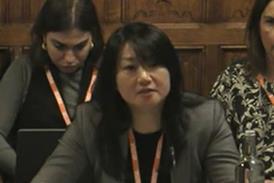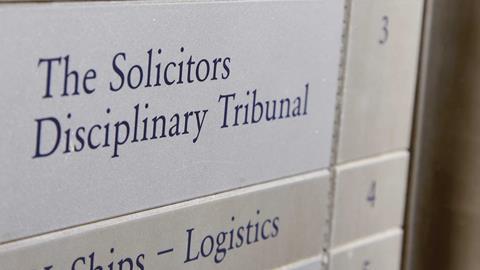Decisions filed recently with the Law Society (which may be subject to appeal)
Keyvan Zamanpour
Application 12208-2021
Admitted 2011
Hearing 26-27 October 2021
Reasons 23 November 2021
The SDT ordered that the respondent should be suspended from practice for six months from 27 October 2021.
While in practice as director and sole owner of Pennine Kennedy Ltd, in respect of the misappropriation of client monies of up to £669,902.47 by person A (an employee of the firm): (i) the respondent had failed to report the misappropriation of client monies to the SRA; (ii) he had falsely stated in an email to the SRA and/or its FIO that to the best of his knowledge there were no issues or qualifications to be reported in respect of the firm as a partnership entity, when he knew that was not the case; (iii) he had falsely stated to the SRA and/or its FIO words to the effect that he was not aware of any misuse of client money and/or that he was not aware of any problems with the firm’s books of account, when he knew that was not the case, thereby breaching principles 2, 6 and 7 of the SRA Principles 2011; rule 8.5(e) of the Authorisation Rules 2011; principles 2, 4 and 5 of the SRA Principles 2019; paragraphs 7.3, 7.4(a), 7.7 and 7.8 of the Code of Conduct for Solicitors 2019; and paragraphs 3.9, 3.10, 9.1, 9.1(d) and (e), and 9.2 (b) and (c) of the Code of Conduct for Firms 2019. He had acted dishonestly.
He had made false statement(s) in the firm’s professional indemnity proposal form to the effect that there were no material circumstances to be disclosed, when that was not the case, thereby breaching principles 2 and 6 of the 2011 Principles. He had acted dishonestly.
The respondent’s motivation was a desire to protect person A. As a result of the respondent replacing the funds taken by person A, no clients had lost out as a result of his failure to report the matter. Reputational harm was caused in circumstances where a solicitor did not report serious misconduct to the regulator and made false statements. However the respondent had not intended or foreseen harm by his failure to report because he had anticipated that matters would come to light eventually and he had promptly made good the loss.
The misconduct was aggravated by the respondent’s dishonesty and the fact that over a period of seven months he had made misrepresentations to different audiences in order to delay any investigation.
The respondent had made good the loss at personal cost to himself rather than making a claim on his insurance. There had been a number of instances of concealment and misrepresentation, but all had arisen out of a single event in a previously unblemished career.
The usual sanction where misconduct included dishonesty would be a strike-off. However, the medical evidence had, in particular, persuaded the SDT that the circumstances were exceptional and were inextricably linked to the dishonesty. It would be disproportionate in the particular circumstances of the case to impose the ultimate sanction.
The respondent was ordered to pay costs of £30,000.
Mohamed Faliq Mohamed Ismail
Application 12277-2021
Admitted 2013
Hearing 7 December 2021
Reasons 14 December 2021
The SDT ordered that the respondent should be struck off the roll.
The respondent had been convicted by magistrates of:
(i) making indecent photographs, namely 1,076 Category A moving and 2,173 still images of a child contrary to sections 1(1)(a) and 6 of the Protection of Children Act 1978;
(ii) making indecent photographs, namely 221 Category B moving and 2,476 Category B still images of a child contrary to sections 1(1)(a) and 6 of the Protection of Children Act 1978;
(iii) making indecent photographs, namely 39 Category C moving and 9,610 Category C still images of a child contrary to sections 1(1)(a) and 6 of the Protection of Children Act 1978;
(iv) distributing indecent photographs or pseudo-photographs, namely 20 Category A moving and 9 Category A still images of children contrary to sections 1(1)(b) and 6 of the Protection of Children Act 1978;
(v) distributing indecent photographs or pseudo-photographs, namely six Category B still images of children contrary to sections 1(1)(b) and 6 of the Protection of Children Act 1978; and
(vi) distributing indecent photographs or pseudo-photographs, namely one Category C moving and one Category C still images of children contrary to sections 1(1)(b) and 6 of the Protection of Children Act 1978.
The respondent was sentenced to 16 months’ imprisonment suspended for 18 months. He was further made subject to a Sexual Harm Prevention Order for five years and was placed on the Sex Offenders Register for 10 years.
By virtue of those convictions he had breached principles 2 and 6 of the SRA Principles 2011.
The parties had invited the SDT to deal with the allegations against the respondent in accordance with a statement of agreed facts and outcome.
The SDT had reviewed all the material before it and was satisfied on the balance of probabilities that the respondent’s admissions had been properly made.
The harm caused by the respondent’s misconduct was at the top end of the spectrum with regards to seriousness.
He had no previous disciplinary proceedings recorded against him and he had accepted his guilt from the outset in both the criminal and the SDT proceedings.
The respondent was ordered to pay costs of £2,082.
Bryan Howard Lewis
Application 12241-2021
Admitted 1978
Hearing 5 November 2021
Reasons 17 December 2021
The SDT ordered that the applicant’s application for restoration to the roll should be refused.
The applicant had been admitted to the roll in 1978. He had appeared before the SDT on three previous occasions and had ultimately sought removal from the roll voluntarily in 1992 on grounds of ill-health.
On 22 January 1993, in the Nottingham Crown Court the applicant had pleaded guilty to one count of ‘making a false instrument’ in that he had falsely stated on a passport application that he had known the individual for two years when in fact he had not.
He was made subject to a two-year conditional discharge. He did not bring the matter to the attention of the SDT in the third set of SDT proceedings which was heard four months later, and as a result of which the SDT had ordered that the applicant should not be restored to the roll without its permission.
The applicant sought restoration to the roll. He relied upon his experience within a legal setting as evidence of remediation.
However the weight attached to such rehabilitation was reduced because the evidence of rehabilitation relied upon had taken place during employment obtained without the permission of the SRA, in disregard of the order imposed by the SDT in 1993.
The failure of the applicant to ensure his compliance with that order at all times undermined his assertion of rehabilitation and was demonstrative of further regulatory non-compliance.
The SDT had concluded that the applicant had little insight into his previous failings, was unable to accept responsibility for the same, demonstrated no remorse and held no contrition.
The applicant had been subject to three sets of regulatory proceedings resulting in shortfalls in client accounts of many hundreds of thousands of pounds. The SDT noted, with some concern, that he had made no efforts to make good the shortfalls in client accounts despite having been discharged from bankruptcy in 1996.
The respondent was ordered to pay costs of £3,000.
Mia Branchette
Application 12229-2021
Admitted 2014
Hearing 22-23 November 2021
Reasons 8 December 2021
The SDT ordered that the respondent should be struck off the roll.
While in practice as a solicitor at Capsticks Solicitors LLP, between 8 January 2018 and 3 September 2018, the respondent had made statements to representatives of her client, CHS, which were untrue and were likely to be misleading as to the progress of proceedings which she was conducting upon its behalf, and which she knew, or ought to have known, were liable to have that effect at the time she had made them, thereby breaching principles 2 and 6 of the SRA Principles 2011. The respondent had acted dishonestly.
Between 3 September 2018 and 11 September 2018, she had made statements to representatives of her employer, Capsticks Solicitors LLP, which were untrue and were likely to mislead them as to the progress of proceedings which she was conducting upon behalf of CHS and which she knew, or ought to have known, were liable to have that effect at the time she had made them, thereby breaching principles 2 and 6. The respondent had acted dishonestly.
The respondent had been motivated by her desire to conceal her failing to progress her client’s case. She had caused harm to the client by preventing them from obtaining monies that were owed to them.
Her conduct was deliberate, calculated and repeated, had continued over a period of time and had been aggravated by her proven dishonesty.
In view of the serious nature of the misconduct, in that it involved dishonesty, the only appropriate and proportionate sanction in order to protect the public and maintain public confidence in the integrity of the profession and the provision of legal services, was to order that the respondent should be struck off the roll.
The respondent was ordered to pay costs of £5,770.
Elizabeth Ellen and MdR (A firm formerly known as Mishcon de Reya Solicitors)
Application 12187-2021
Hearing 14-17 September, 29 October and 6 December 2021
Reasons 11 January 2022
The SDT ordered that the allegations against the first respondent (admitted 2007) should be dismissed. The SDT further ordered that the second respondent (recognised body) should pay a fine of £25,000.
The allegations against the first respondent were that, while in practice as a solicitor at the second respondent, formerly known as Mishcon de Reya Solicitors, she had caused or allowed payments to be made into and from the firm’s client account in circumstances amounting to the provision of a banking facility, thereby breaching rule 15 of the Solicitors Accounts Rules 1998, rule 14.5 of the SRA Accounts Rules 2011 and principle 8 of the SRA Principles 2011.
Those against the second respondent were that it had failed to take any or adequate steps to prevent payments being made into and from the firm’s client account in circumstances amounting to the provision of a banking facility, thereby breaching rule 15 of the 1998 Rules, and rule 14.5 of the 2011 Rules and principle 8.
The SDT found that the first respondent had neither caused nor allowed the payments to be made, and it followed that her conduct had not breached principle 8. Accordingly, the allegation against the first respondent had not been proved.
The second respondent’s admissions had been properly made. It had not been motivated to commit misconduct. Its misconduct had arisen as a result of its failure to properly monitor its own policies and procedures. There was no evidence of any harm caused as a result of the second respondent’s failings. The misconduct was aggravated as it had continued over a period of time.
Notwithstanding that the misconduct was unintentional and unwitting, the mistakes made by the firm were serious and it was culpable.
A fine was the only appropriate sanction; £25,000 adequately reflected the seriousness of the second respondent’s misconduct but took into account the compelling mitigation advanced on its behalf.
There was no order as to costs against the first respondent.
The second respondent was ordered to pay costs of £32,500.





